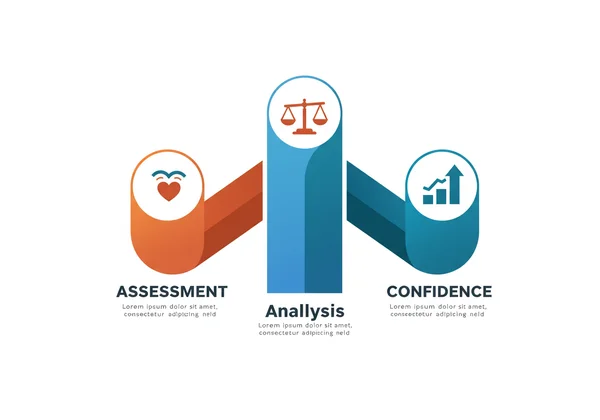Mastering Self-Awareness for Your EQ Test & Growth
September 7, 2025 | By Isla Caldwell
Unlock your true potential by understanding the profound power of self-awareness. This foundational pillar of emotional intelligence is your starting point for meaningful personal growth, stronger relationships, and lasting career success. Before you can manage your emotions or empathize with others, you must first understand yourself. In this guide, we'll explore what self-awareness truly means and how you can cultivate it, setting the stage for a truly transformative EQ test. But What is an EQ test and how does it relate to self-awareness? It's a tool designed to measure these very skills, and your journey begins with an honest look inward. Ready to begin? Take your first step with our insightful EQ test experience.

Understanding Self-Awareness: An Essential EQ Dimension
Self-awareness is more than just knowing your favorite color or what you like to eat; it's the ability to see yourself clearly and objectively through reflection and introspection. As one of the core eq dimensions, it acts as the cornerstone upon which all other emotional intelligence skills are built. Without it, self-management is directionless, empathy is shallow, and relationships are built on shaky ground.
Developing this skill means gaining a clear perception of your personality, including your strengths, weaknesses, thoughts, beliefs, motivations, and emotions. It allows you to understand how other people perceive you, your attitude, and your responses in the moment. This clarity is not about judgment; it's about recognition. It’s the essential first step toward personal development and achieving a higher emotional intelligence score.
What is Self-Awareness in Emotional Intelligence?
In the context of emotional intelligence, self-awareness is the capacity to tune into your own feelings, thoughts, and actions. It’s about recognizing how your emotions affect your behavior and how your behavior, in turn, impacts others. Someone with strong self-awareness can identify their emotional state without being overwhelmed by it. They understand the "why" behind their feelings, connecting them to specific triggers or situations.
This understanding provides an internal compass that guides your decisions. For example, if you feel anxious before a big presentation, self-awareness allows you to recognize that feeling, understand it stems from a fear of public speaking, and take steps to manage it rather than letting it sabotage your performance. A comprehensive emotional intelligence test is designed to pinpoint your current level of this crucial skill.
The Three Pillars of Personal Self-Awareness
To truly grasp self-awareness, it helps to break it down into three interconnected components. Mastering these pillars provides a solid foundation for your personal growth journey.
- Emotional Self-Awareness: The ability to recognize and understand your own emotions as they happen. It's about naming your feelings—"I feel frustrated," "I am feeling joyful"—and understanding what caused them. It’s the difference between feeling a vague sense of unease and knowing you're anxious because of an impending deadline.
- Accurate Self-Assessment: This involves knowing your own strengths and limitations. People with this skill are realistic. They know what they are good at and where they struggle. This honesty allows them to seek help when needed, focus on developing weaker skills, and leverage their strengths effectively.
- Self-Confidence: A strong and positive sense of your self-worth, grounded in an accurate self-assessment. It’s not arrogance; it's a quiet trust in your own abilities, values, and judgment. This confidence allows you to handle criticism gracefully and believe in your capacity to navigate life's challenges.

Cultivating Emotional Self-Awareness for Deeper Insight
Knowing what self-awareness is and actively developing it are two different things. Cultivating emotional self-awareness is an ongoing practice that requires patience, curiosity, and honesty. It is a journey of turning your focus inward to gain deeper insight into your internal world. The more you practice, the more intuitive it becomes, transforming how you experience your daily life.
This process isn't about eliminating negative emotions but about understanding them. Every feeling, whether it's joy, anger, or sadness, carries valuable information. By learning to listen to these emotional signals, you can make more conscious choices, improve your decision-making, and build a more authentic life. The goal is to move from being reactive to being responsive.
Recognizing Your Feelings: From Triggers to Reactions
The first step in building emotional awareness is to become a curious observer of yourself. Pay attention to your internal state throughout the day. How do you feel when you wake up? What happens to your mood after a difficult conversation? Identifying your emotional patterns starts with noticing the cause-and-effect relationship between events (triggers) and your feelings (reactions).
Try to pause several times a day and simply ask yourself, "What am I feeling right now?" Don't judge the answer; just name it. This simple act of labeling your emotions can reduce their intensity and give you a sense of control. Over time, you'll begin to see patterns in your emotional triggers, which is the first step toward managing them effectively and improving your eq score.

The Role of Accurate Self-Assessment in EQ Growth
An honest and accurate self-assessment is the engine of personal growth. Without a clear picture of where you stand, it's impossible to create a roadmap for where you want to go. This involves looking at your skills, knowledge, and behaviors without bias. It requires the courage to acknowledge your weaknesses without self-criticism and to recognize your strengths without arrogance.
One of the most effective ways to get an objective baseline is through a structured evaluation. A scientifically designed online eq test can provide invaluable insights into your emotional landscape. It reflects your patterns back to you, highlighting areas of strength and opportunities for development. This data-driven feedback removes the guesswork and provides a clear starting point for your journey to improve emotional intelligence.
Practical Strategies to Improve Self-Awareness
Developing self-awareness is like building a muscle—it requires consistent exercise. The good news is that there are many simple, powerful techniques you can integrate into your daily life to improve self-awareness. These practices don't require a huge time commitment, only a willingness to be present and reflective.
Start by choosing one or two strategies that resonate with you and practice them consistently. Remember, the goal is progress, not perfection. Each small step you take to understand yourself better contributes to a significant increase in your overall emotional intelligence and well-being.
Mindfulness and Reflective Journaling Techniques
Mindfulness is the practice of paying attention to the present moment without judgment. It can be as simple as focusing on your breath for a few minutes each day. This practice trains your brain to observe your thoughts and feelings as they arise, rather than getting swept away by them. It creates a space between stimulus and response, giving you the power to choose your actions more consciously.
Reflective journaling is another powerful tool. At the end of each day, take a few minutes to write down your thoughts and feelings. Consider these prompts:
-
What was one situation that triggered a strong emotional response in me today?
-
How did I handle it?
-
What could I do differently next time? This practice helps you process your experiences, recognize patterns, and gain emotional clarity over time.

Seeking Feedback and Embracing Constructive Criticism
While introspection is crucial, we all have blind spots. Seeking feedback from trusted friends, family, or colleagues can provide a valuable external perspective. Ask specific questions like, "How do I come across when I am under pressure?" or "What is one thing I could do to be a better listener?" Approach these conversations with an open mind and a genuine desire to learn.
Embracing constructive criticism is a sign of high self-awareness. Instead of becoming defensive, view feedback as a gift of information that can accelerate your growth. Thank the person for their honesty and reflect on their words. This practice not only helps you see yourself more clearly but also strengthens your relationships by demonstrating humility and a commitment to self-improvement.
Your Journey to Higher EQ Begins with Self-Awareness
Mastering self-awareness is not a one-time achievement but a lifelong journey of discovery. It is the fundamental skill that unlocks your potential to manage your emotions, connect with others, and lead a more fulfilling life. By understanding your internal landscape—your emotions, strengths, and weaknesses—you empower yourself to navigate the world with greater confidence and purpose.
The insights you gain are the first and most critical step toward enhancing your emotional intelligence. Are you ready to take that step and see where you stand? Begin your journey of self-discovery today. Test my eq with our free, scientifically validated assessment and receive instant insights to guide your growth. For those seeking a deeper dive, our AI-powered report offers a personalized action plan to help you unlock your full potential.
Frequently Asked Questions About Self-Awareness & EQ Tests
What is an EQ test and why is self-awareness important for it?
An EQ test is an assessment designed to measure various aspects of your emotional intelligence, including self-awareness, self-management, social awareness, and relationship management. Self-awareness is crucial because an honest and reflective mindset is required to answer the questions accurately, ensuring the results truly reflect your emotional patterns and tendencies.
How do I check my EQ level, starting with self-awareness?
You can begin checking your EQ level through self-reflection practices like journaling and mindfulness. However, for an objective and comprehensive measure, using a standardized tool is highly recommended. You can get an immediate baseline by taking a free eq test designed to assess all the core EQ competencies.
Can I raise my EQ through developing self-awareness?
Absolutely. Emotional intelligence is not a fixed trait; it can be developed and strengthened over time. Because self-awareness is the foundational skill, any effort you put into improving it will have a positive ripple effect on all other areas of your EQ, from managing stress to improving your relationships.
What are the signs of high emotional self-awareness?
People with high emotional self-awareness can accurately identify their own emotions and understand their impact. They know their strengths and weaknesses, have a strong sense of self-worth, and are open to feedback. They can often articulate their feelings clearly and understand the connection between their emotions and their actions.